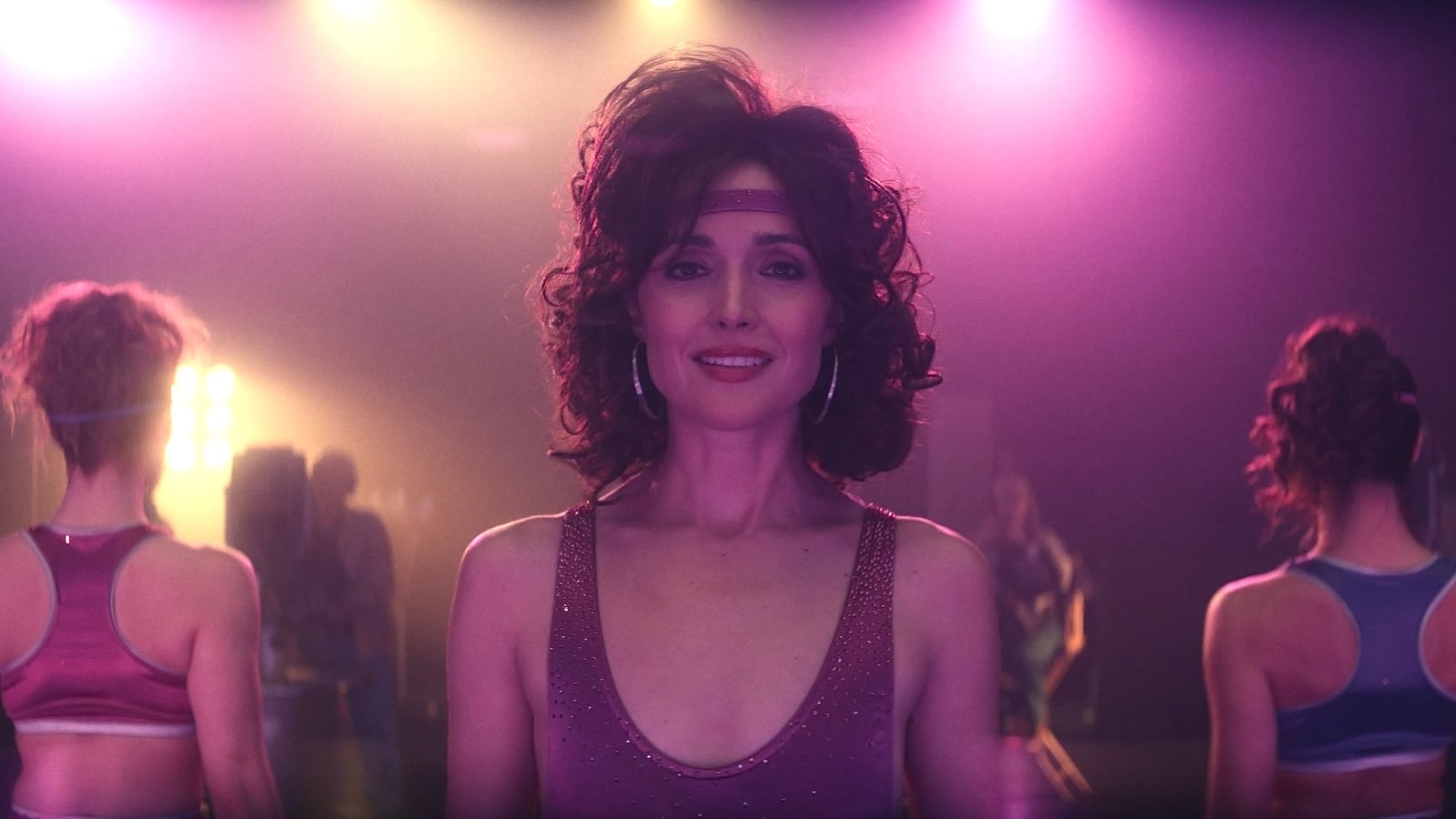When the trailer for Apple TV+’s new series Physical premiered, it seemed as if it was a reward to pop-culture obsessives for weathering the trauma of the pandemic.
Perhaps inspired by the 10th anniversary of Bridesmaids, there was an almost omnipresent online discourse at the time surrounding how underappreciated Rose Byrne’s signature performances have been, both the tightly wound and smug, though insecure, Helen in the Kristen Wiig comedy and the sarcastic glamour-puss villain Rayna in Spy. Now here was a new series that elevated Byrne to leading lady status. She was playing a frustrated ’80s housewife who discovers aerobics and uses it to build an empire that would be her ticket out of her humdrum life.
There was Byrne with permed hair so big that it practically bursts beyond the lens, and sporting a leotard in a purple hue so dated it may actually have gone extinct once the ’90s hit. Her envy-inducing cheekbones frame her plastered smile to such effect that you believe they may actually shatter the glass ceiling that Byrne’s character, Sheila, is surging toward with her new business. She starts chirping fitness-instructor motivational speak about breaking a sweat, and you could almost hear her biggest fans break into applause in return.
Social media chatter gasped and gagged at how fabulous it all looked. Little did they know how dark Physical would actually be, let alone how Sheila feels about herself.
Her inner monologue is a cesspool of bile. She narrates her hatred for herself, her looks, her worth, and especially her body. Imperfections, especially physical ones, on other people disgust her. And her thoughts are shockingly unfiltered about how revolted she becomes. In these voiceovers, Sheila is cruel, judgmental, unfair, and, in a way, more honest, even in the nastiness, than most TV characters—especially women—are ever allowed to be.
We’re a culture accustomed to the rah-rah inspiration of fitness personalities, ones like Sheila aspires to be. SoulCycle instructors encourage you to be your best self. Peloton teachers gaze through the bike’s built-in TV screen to congratulate you on making time in the day to invest in your health. Leaders of Barry’s Bootcamp classes bark affirmations at you like a dare to give up on that set of squats.
But we never think about the darker underbelly beneath the veneer of positivity and motivation. In that respect, Physical is the tantalizing epitome of the role that Byrne does so well: A woman who presents a flawless porcelain facade, but is so fragile that one crack could cause it all to shatter and all the mess underneath would come pouring out.
“It’s deeply uncomfortable,” Byrne tells The Daily Beast in a Zoom interview ahead of Physical’s premiere on Apple TV+ this Friday. “But it’s the human condition. Like it or not, we do have these thoughts.”
In the series, Sheila and her husband Danny (Rory Scovell) are a San Diego couple who bonded over ’60s protest movements and marching for radical change. Their frustration with Reagan-era consumerism and complacency confronts them wherever they go, sometimes literally, like in the local business-destroying mall where Sheila goes and discovers an aerobics class.
A former ballet dancer upset with how her body has aged, she feels invigorated by the class and its enigmatic instructor Bunny (Della Saba). The class becomes an obsession and, eventually, opportunity. At the dawn of the VHS boom, she sees potential in teaching a session for fellow housewives to do at home. Thus launches a crusade, one that is nearly derailed at every turn by the toxicity of Sheila’s inner monologue and her propensity for self-destruction.
“I hope you’re rooting for her because she’s definitely an antihero,” Byrne says. “She does some ruthless things. But like any great character in fiction or in life who’s complicated, you still hopefully want to root for them.”
While aerobics may have grown into a bit of a pop-culture joke over the decades, with Suzanne Somers’ Thighmaster and Jane Fonda’s VHS workout videos relics of another time, Physical reminds that it wasn’t always that way. Sheila takes aerobics seriously, and so does the show.
Byrne remembers that by the time she discovered what aerobics was—there was a morning show program called Aerobics Oz Style that used to air while she was growing up in Sydney—the fad was already considered dated. But the series spotlights how the women who pioneered the fitness craze were a trailblazing tribe of entrepreneurs. When Sheila, for all the ways she and her husband present as a progressive couple, realizes that she doesn’t really have any agency in her own life, this becomes an arena to create a brand and image on her terms.
“The wellness space is now so saturated, but back then it was groundbreaking for women to start businesses in that space, like Jenny Craig, for instance,” Byrne says. You could draw a line from what Sheila was embarking on to the success of female-targeted powerhouses like Sara Blakely’s Spanx or Gwyneth Paltrow’s GOOP.
Byrne laughs when talking about learning the aerobics routines and filming those long fitness scenes. “I’m really uncoordinated,” she says, grinning. “I’m lazy. These things did not come naturally to me.”
Complicating matters, like it did for so many, was COVID. Byrne trained over Zoom from Byron Bay, Australia—where she quarantined during the pandemic with her partner, actor Bobby Cannavale—with the show’s Los Angeles-based choreographer Jennifer Hamilton. Two or three days a week, she’d be sweating in her living room while staring at her computer’s camera.
By the time shooting began, she was grateful to just be on set again, for the first time in six months. But she also learned that having the aerobics to do, while occasionally exhausting, was an actor’s gift. It gave her a task to keep busy while shooting—even if that task was exercise. The patting-your-head-while-rubbing-your-belly challenge of it all was discovering what Sheila’s voice would be as a fitness instructor. How would she harness all of the horrible rhetoric of her inner dialogue into something motivational while teaching? How does Regina George masquerade as Tracy Anderson?
It’s impossible to extricate a series about a woman finding salvation in fitness from the darkness of the pressure to be thin. That’s the generator of Sheila’s interior cruelty and self-flagellation. A major plot of Physical chronicles how Sheila navigates a severe bulimia disorder.
The series explores the traumatic trigger for Sheila’s decades-long battle. It reveals the ritual she sets up for bingeing, and the lengths to which she goes to conceal it. It explores how urgent her episodes are, her self-loathing afterward, and the cyclical nature of her pledging never to do it again—“this is the last time”—only to fall back into old patterns.
“The project is to really take it as seriously as a lot of cable shows take other addictions,” Physical creator Annie Weisman told The New York Times.
“I can’t speak to the journalists. I never know what they’re really thinking about. I long ago gave up trying to figure that out,” Byrne laughs when asked about talking through that part of Sheila’s arc in interviews. Eating disorders and body image are issues that people are highly sensitive about, yet have a hard time talking about openly, and with any sort of nuance. “I’ve definitely had women confess things about their own experiences,” she adds.
Because the audience is privy to Sheila’s inner thoughts, Physical is more unflinching about its portrayal of an eating disorder than possibly any other show before it. You hear her narrate why she does it, and how it makes it feel after. It’s a perspective that’s not typically given space.
“And why is that?” Byrne says. “I mean, why? It's an interesting conversation to start.” On TV, eating disorders are often “a punchline, or it’s the Lifetime movie of the week,” she adds. “It's rarely really given the kind of breadth and depth that Physical is really attempting to do.”
If the idea of the narration is that there is more to Sheila than what she presents to the world, then that could be true about Physical, too. It’s a show about fitness, but it’s also, in a sly way, about feminism. It’s about how a woman who feels trapped battles her personal demons, grapples with her self-image, and discovers something that not only gives her self-worth, but transforms her into someone who believes she can achieve more, and on her own terms.
It’s the second consecutive TV project that Byrne has been a part of that is a period piece tackling feminist issues. Last year, she portrayed Gloria Steinem at the height of the women’s liberation movement in FX on Hulu’s Mrs. America. It’s been a formative experience for Byrne to explore these ideas through how women experienced them at different turning points in the past.
“We stand on the shoulders of these women, of Gloria Steinem and Betty Friedan, and of the Jenny Craigs, too,” she says. “There are so many strides that have been made. There's no Time’s Up without the women’s movement in the 1970s. There's no Me Too.”
The thing to grapple with is how long there still is to go. “I read things about reproductive rights getting taken away and people chipping away at that around America, and it just blows my mind. I can't I can't believe that's still being politicized.”
Unintentionally, she then channels Sheila leading an aerobics class: “It's like three steps forward, two steps back.”


